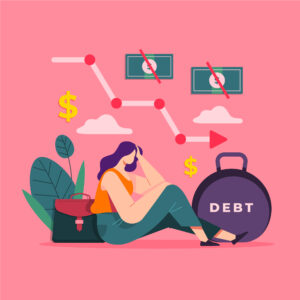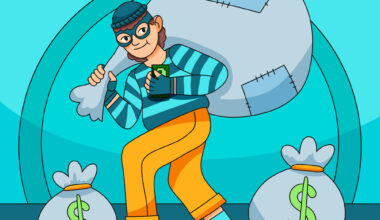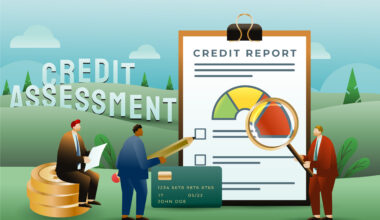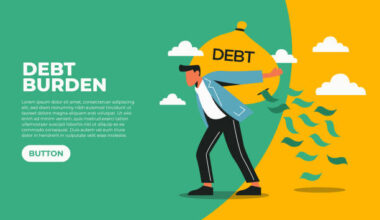Introduction

There comes a moment when you realise that your finances aren’t just “a little stressed” — they’re being dictated. Maybe the bills keep arriving. Maybe you’re dreading checking your account. Maybe debt worries wake you at night. That’s when you realise: debt is controlling your future.
In this post, we’ll explore how to know if debt is controlling your future. We’ll look at the warning signs, help you assess your own situation, compare healthy debt vs. controlling debt, and give you a practical roadmap to shift from being controlled to being in control. The tone is conversational because this is about your life, your money — and you deserve to feel empowered, not overwhelmed.
What it means when debt is controlling your future
Debt can be a useful tool — when managed. It becomes a trap when it dictates your decisions, your mindset, and your opportunities. When debt is controlling your future, you may find yourself:
- Making financial choices based on what you owe, not what you want.
- Feeling like you’re working just to service past decisions rather than build your tomorrow.
- Constantly under stress about money, unable to believe that tomorrow might be different.
One article points out that there are specific indicators when your debt has tipped from manageable to controlling your life. For example, being unable to comfortably repay or feeling like your debt load is unsustainable. (Home Credit)
Understanding this shift — from using debt as a tool to being ruled by debt — is the first step to knowing if your future is being controlled by what you owe.
Recognising the warning signs that debt is controlling your future
You don’t have to wait for crisis-to-hit to realise things are off track. Here are some of the most common warning signs that debt may be controlling your future. If you recognise several of these in yourself, it’s time to pause and act.
- Making only minimum payments on credit cards or loans, so balances barely move.
- Relying on borrowing to pay everyday expenses, or using credit to cover what should be basic living costs. (CBS News)
- Debt payments consume a large portion of income, leaving little for savings, emergencies or growth. (Hoyes, Michalos & Associates Inc.)
- You’re stressed, anxious or losing sleep because of your financial situation. (alanmcgee.ie)
- Your credit cards are maxed out or your debt keeps growing, not shrinking.
- You’re avoiding bills or collection calls, or you feel shame or panic about opening your statements.
- You have little to no savings, or you cannot face an unexpected expense without borrowing.
These signs don’t guarantee you’re doomed — but they are red flags that debt may be steering your future rather than you.
Why this matters: the cost of letting debt control your future
When debt controls your future, the effects go beyond just finance. The cost is:
- Growth is stunted: Money that could go into savings, investments or life opportunities instead goes to servicing debt.
- Stress and health impacts: Financial strain shows up in sleep loss, anxiety and even physical symptoms — research links heavy debt with worse mental health. (Health)
- Limited choices: You may feel locked into jobs you don’t like, skip opportunities (education, moving cities, starting a business) because your finances restrict you.
- Longer repayment horizons and higher costs: Debt not only stays longer but costs more — via interest, fees, missed opportunities. For example, consistently making minimum payments increases the total cost over time. (The Sun)
Simply put: when debt controls your future, you’re living for yesterday’s choices, not tomorrow’s potential.
Comparison: Controlled debt vs. Controlling debt
Here’s a table to help you see the difference between debt being managed and debt managing you:
| Feature | Debt You Manage | Debt Controlling Your Future |
|---|---|---|
| Payment behaviour | Making full or significant payments | Minimum payments only or growing balances |
| Impact on daily life | Some attention, but manageable | Constant stress, limited options |
| Savings/emergency fund | Active or building | Little to none |
| Borrowing for need vs wants | Occasionally for strategic reason | Regularly for essentials or to service debt |
| Credit/financial health | Stable or improving | Deteriorating, frequent late/missed payments |
| Control & choices | You have flexibility | You feel trapped, reactive, constrained |
If your situation mostly fits the right-hand column, it’s a strong indicator that debt is controlling your future.
How to know your personal debt-situation: a step-by-step evaluation
Let’s walk through a practical self-assessment:
Step 1: List and measure your debts
- Write down each debt: type (credit card, personal loan, payday loan, etc), balance, interest rate, monthly payment.
- Add up total monthly debt payments and compare to your monthly net income.
Step 2: Calculate key ratios
- Debt‐to‐income (DTI): Total monthly debt payments ÷ monthly take-home income. High ratios (often above ~40%) indicate risk. (CBS News)
- Credit utilisation: For credit cards, your balance vs your credit limit. A utilisation above ~30% is risky. (CBS News)
- Check if you have any savings or emergency fund.
Step 3: Identify your behaviours
- Do you use credit to pay for essentials?
- Are you missing payments, making only minimums, or borrowing more to pay old debts?
- Are you avoiding looking at your statements, or constantly juggling repayments?
Step 4: Ask the future-focused questions
- If your income drops by 20 %, can you still meet obligations?
- Could you redirect money toward savings or goals, or is all money tied up in debt servicing?
- Are you foregoing opportunities (starting business, further education, investing) because of debt load?
If you answer yes to several of these questions, you have a strong case that debt is controlling your future.
What to do if you determine debt is controlling your future
Recognising the issue is half the battle. Here are actionable steps to shift direction:
1. Create a complete picture
- Update your list from Step 1.
- Consolidate debts where possible (only if it reduces interest/cost and doesn’t increase risk).
- Check your credit report for accuracy.
2. Make a realistic budget and repayment plan
- Split your income into essentials, debt payments, savings, variable spending.
- Prioritise high‐interest debt or debt causing most stress.
- Set a target: “reduce debt payments to X% of income by month 6”.
3. Adjust lifestyle & spending behaviours
- Avoid new debt—no more borrowing to pay past debt.
- Review discretionary spending (subscriptions, dining out, etc).
- Build an initial emergency fund (even a small one).
4. Seek support and advice
- Talk to a non-profit credit counselling service or financial coach.
- If appropriate, discuss with lenders about restructuring. (Home Credit)
- In extreme cases consider debt management programs.
5. Monitor progress & celebrate wins
- Each month record your debt balances, payment amounts, and savings.
- Celebrate small wins (paid off a card, reduced interest by refinancing, etc).
- Review quarterly: Are payments decreasing? Is savings increasing? Are you regaining choice?
Real-life stories: when debt controlled the future — and when it didn’t
Consider two simplified stories:
Story A: John
John had three credit cards, making just the minimum payments. He used a fourth to pay a surprise car repair. His debt payments were over 50% of his net income. He skipped savings. He felt trapped and exhausted. Outcome: Debt was controlling his future.
Story B: Lisa
Lisa also had debts — student loan, car loan, credit card. But she listed them, consolidated where possible, made one extra payment monthly on highest interest. She built a $500 emergency fund to avoid new debt when surprises hit. Within 18 months, her debt payments dropped to under 30% of income. Outcome: She regained control and freed her future.
The difference? Awareness, structure, and action. That’s how you shift from “debt controlling me” to “I’m controlling debt”.
Why this mindset shift matters: from reactive to proactive
When you treat debt as something that can control your future, you’re operating in reactive mode — you respond to bills, threats, emergencies. When you shift to thinking “Is debt controlling me?” you move to proactive mode — you assess, you plan, you act ahead.
This mindset shift matters because:
- You regain agency: instead of feeling powerless, you set the rules.
- You reduce stress: you’re working toward solutions, not just surviving.
- You unlock opportunities: when you’re not weighed down by servicing debt, you can invest time, money and energy into growth.
- You build resilience: you’re prepared for change rather than vulnerable to it.
In essence — you turn debt from a life sentence into a chapter you’re finishing.
Common mistakes to avoid when tackling debt that’s controlling your future
- Ignoring the problem: “I’ll deal with it later” gives debt more time to grow.
- Making only minimum payments: It prolongs the debt and increases cost.
- Relying on new debt to fix old debt: Without behavioural change, you just reshuffle the problem.
- Neglecting savings/emergency fund: Without that, any twist in income puts you back in trouble.
- Underestimating the emotional impact: Debt isn’t only numbers — it affects mood, relationships, decisions.
- Failing to monitor progress: What doesn’t get measured often stays unchecked.
Recognising these mistakes can help you avoid delays and setbacks.
Powerful Strategies: Why Treating Your Personal Finances Like a Business Changes Your Outcome
Conclusion
If you’ve reached this far, you’re doing the right thing — asking the question: “Is debt controlling my future?” That question matters. Because once you recognise the signs, evaluate your situation, and decide to act, you move from being subject to your debt, to being in charge of it.
Here’s what you should do next:
- Review your debt using the steps above.
- Identify whether you’re in the “controlled” or “controlling” column.
- Make a clear plan to shift toward controlling your debt.
- Commit to one measurable action this week (e.g., list all debts, make extra payment, open an emergency fund).
Your future shouldn’t be dictated by what you owed yesterday. It should be shaped by what you choose today. And that shift begins when you recognise: debt shouldn’t control your future — you should control your debt.






